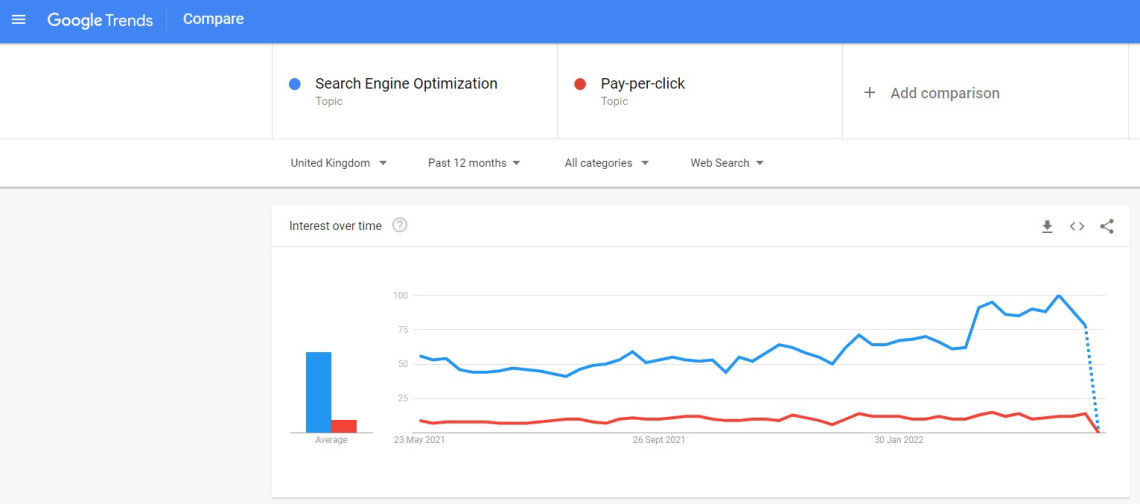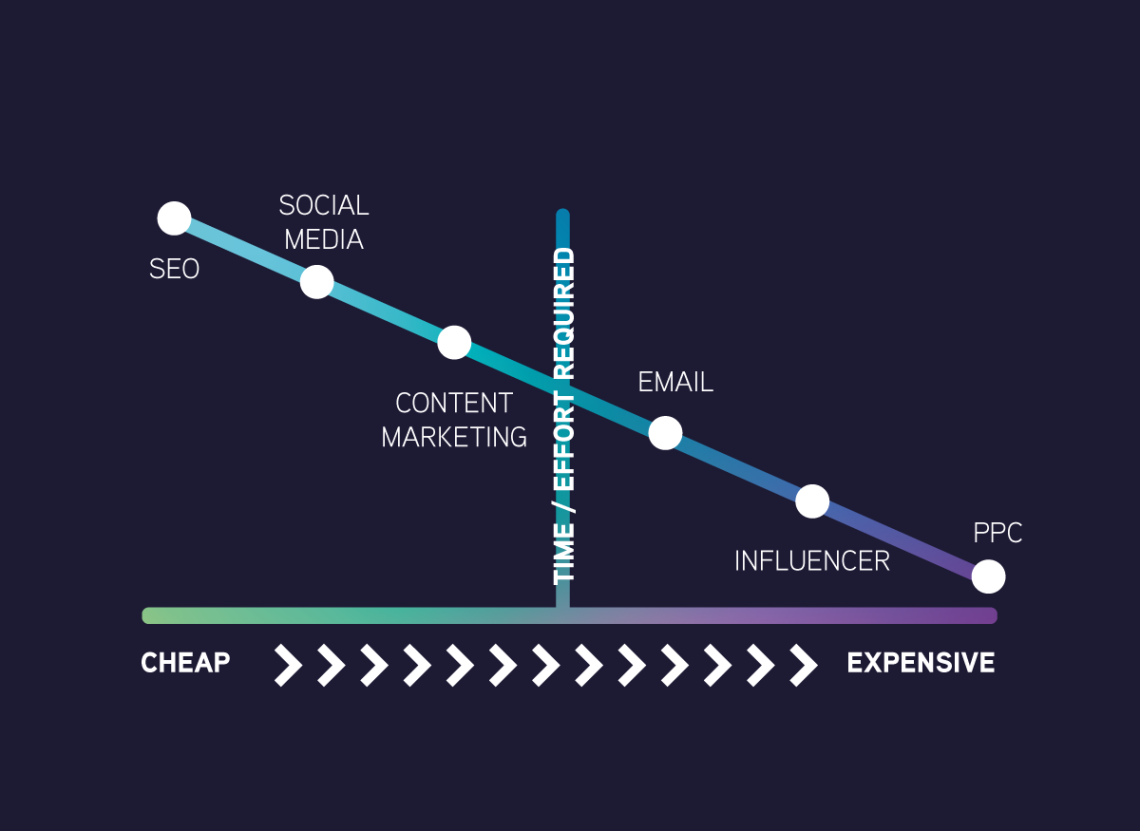Which is the Best Digital Marketing for Start-Ups?
rbracha
As the owner or director of a Start-Up, you are highly unlikely to be in a position to hire a team for each individual discipline of digital marketing. It’s also unlikely that you’ll have the resources to put even a single person on each of SEO, Social Media, Emails, Google Ads etc.
The chances are that you’ll be faced with the choice of one or two staff members (or maybe it’s you as the company owner) trying to learn everything, to get a general idea of what you want to do and how to do it.
Or alternatively, you’ll focus heavily on one aspect and possibly miss out on opportunities. Maybe it’s social media because a lot of your friends are there and they’ll surely support you and your new venture (news flash; very few of your social media friends will support you regularly – don't be disheartened by this), or you’ll sign up Google Ads, because it gets you in front of people searching for your stuff.
Maybe you’ll start an email mailing list but let it fall by the wayside because you didn’t get any sales immediately. Maybe you’ll send a free item to a super-influencer and they’ll gush about your products to their millions of followers and you’ll be an instant hit? Or maybe, just maybe, you’ll build an amazing website that looks the business, but never gets any web traffic.
There are many different things you can do to grow your business start-up as you navigate the bootstrapping stage.

So which type of digital marketing is best for a business start-up?
The answer, as with almost everything, is that it really depends on which industry you’re in, what you want to achieve, and how much budget you have available. It is widely reported that a new business needs to spend between 12% and 20% of its annual revenue on marketing in the first five years of business. We don’t think it needs to be the case. There are many ways and means of achieving great things with your marketing without spending a fortune, but you are the one making the decisions, we can only offer you honest advice on our findings as a new business that has been launched off the back of doing great work for a very successful business.
There are widely recognised as 6 types of digital marketing, and these are our opinions of them, including the pros and Cons of each. Of course, opinions are fully subjective, and if you disagree, we’d love to hear from you.
PAY-PER-CLICK (PPC)
PROs – PPC is a fast-track to the people you’d like to find. Using PPC advertising on Google will enable you to reach people on different stages of their journey, whether they’re in the mood for finding more information and researching products/services, or they’ve done their research and are ready make a buying decision. You are able to set daily budgets, so that when the budget is used, the ads will no longer appear on that day.
Social Media PPC advertising is slightly different; your ads are more likely to be set to target specific demographics, and delivered to the people that platforms such as Facebook feel are more likely to do what you need of them, eg. People who will be more likely to watch a video, click a link, or send you a message to ask more questions.
CONs – PPC can be a very expensive strategy, whichever platform you use, if you do not take the time to learn the costs involved in each type of campaign. Your industry may have very expensive costs for valuable keywords, so do take the time to research before you get into a PPC strategy. Alternatively, you can enlist the help of GEM, and we will talk you through the work as we do it, so that you can eventually complete the work yourself.
Click-fraud is also a potential pitfall for you; this is the act of maliciously clicking on a paid advertisement with the intention of running down the daily budget quickly, or for a website owner to click on the ads on their sites, which sees them receive financial benefit from the likes of Google or Bing.
VERDICT – Get involved in starting a PPC campaign only if you have plenty of budget to play with. PPC is a fast track to your intended audience, but it can eat into your budget very quickly, and even more quickly if you are the subject of click-fraud.
SEARCH ENGINE OPTIMISATION (SEO)
PROs – Effective SEO can often cost nothing but time and effort, plus the inevitable cost of an SEO management tool, as your website and your business grows, if you take your SEO strategies seriously. There are many free resources out there that can do the work for you if you have a small website with only a few pages. On top of this, using tools such as Google Search Console, Google Trends, and additional research tools such as Answer the Public, will help you to plan the kind of content that people are actively searching for.
CONs – Because it is much cheaper to achieve, it is more difficult for a new business to break into the top rankings on the likes of Google quickly. With factors such as the age of your website affecting the trust that a search engine has in your authority on a subject, it is important to make sure you get the other factors, such as mobile-friendliness, absolutely spot on.
VERDICT – We 100% recommend an SEO-driven strategy for any and all businesses that have a website. Bear in mind that as the traffic you will receive from focusing on an SEO strategy will be organic, and therefore largely free, it will take a lot of time. With Gala Tent, we rewrote about half a million words of content over the space of a year, but when we reached the light at the end of that tunnel, we were in the top 3 for our main keywords, which delivered us traffic that would have cost us £20,000 per month had we used solely PPC techniques.

EMAIL MARKETING
PROs – Despite getting a poor rep because of businesses who use the Spray and Pray strategy to spam unwilling participants, email marketing remains a solid and valuable tool for any brand that has messages for their subscribers and customers. As most people will have expressly consented to receiving email communications from you, the open rate is pretty high, especially if you present a consistent and non-invasive approach, and enable people to unsubscribe easily at any time.
The cost of Email Marketing will depend on the number of subscribers you have in your list. Mail management systems usually allow for sliding scale pricing, so it could cost you as little as £50 per month to run a professional, automated and personalised email campaign. It will also save you a lot of time, when compared with sending out a single email at a time.
You can send emails to convey many different messages; newsletters, product advice, product updates, sales and promotions, exclusive content. We say mix it up and give your customers something to look forward to, rather than delete.
CONs – The automation is not perfect, so if a customer subscribes in an odd format, for example they use their surname in the first name field, or they use all capital letters, your personalised email suddenly feels a lot less personal, and a lot more spammy.
The process of building a mailing list of subscribers can be long and take some effort in the post-GDPR age, where people must now opt IN to receiving messages from you as opposed to opting OUT. Never send unsolicited emails to private individuals, or else you might find yourself falling on the wrong side of an expensive and damaging GDPR-related investigation.
VERDICT – A tried and tested method that doesn’t need to cost the Earth, as long as you have something to actually say now and then, and aren’t restricting your output to simply sales-related material.
SOCIAL MEDIA MARKETING
PROs – There are so many different platforms that there should be one that is ideal for promoting you and what you do, and with almost 4 BILLION global active users on all social media platforms, it represents a massive opportunity to reach an audience that works for you.
Social media also gives brands the opportunity to display some sort of personality and have fun with their followers, which if you do it well will help you to build a strong group of loyal customers.
CONs – The more commercial that social media platforms become, the fewer of your followers will see your content organically, which means that you’ll end up having to pay to boost it to more followers if you have an important message, or create a targeted advertisement to reach new people and gain more followers.
Social media has also become the fastest growing method of customers contacting businesses and brands for customer service and aftersales concerns in recent times, which means they are quite often very quick to take to Twitter or Facebook to express their anger or disappointment directly to you.
VERDICT – As a brand, it is a vital that you have some form of social media presence and use your platforms to display the very best of what you do. The most effective profiles use personality and engage their followers with informative, educational or entertaining content. The benefits of a well-run social media profile far outweigh the potential for a negative experience.

INFLUENCER MARKETING
PROs – Working with an influencer of any size has the potential for exposing your brand to a huge new audience, raising big awareness of who you are and what you do. No matter what the product or service is that you supply, there will likely be an influencer that can work for what you need. Sometimes all that is required is a well-timed compliment and some free product and you may find yourself faced with hundreds of orders, other times it may require some form of financial outlay, depending on the size and type of audience up for grabs.
There are many different types of influencers, using many different platforms in many different ways. Equally, the audiences they receive are varied. The current trend in digital marketing is for finding content creators whose audiences aren’t necessarily huge, but they are invested in hearing what the influencer has. For example, you don’t need to spend thousands of pounds tapping into the audience somebody with a million followers, when somebody who has ten thousand followers and speaks well about your industry would have a more invested audience.
CONs – People are increasingly suspicious of being sold to, meaning that a sales pitch by their favourite influencer talking about you and your product can go in quite the opposite direction to what you hoped. Overt sales pitches are a thing of the past, so if you work with an influencer, you should look at creative ways of raising awareness of your brand.
VERDICT - If you can avoid using a direct, scripted sales pitch, and instead find a creative way to promote your products or services via an influencer to their audience, then you may just find it to be a fantastic type of digital marketing. Don’t be blinded by audience sizes on offer, as a micro-influencer with 11,000 followers who usually always engage with them might be just as valuable as one with 500,000 followers who rarely engage. Research the notable people in your industry who talk about the kinds of products and services you supply.

CONTENT MARKETING
PROs - In this age where consumers are less likely to be sucked in by blatant sales techniques in advertising, content marketing helps brands and businesses to build real and meaningful relationships with their audiences. Instead of shouting Buy my stuff through direction promotional activity, content marketing instead engages in conversations, delivers valuable and informative messages, and builds trust.
Good written content on your website can drive your discoverability through search engines, great video or image-based content on your social media platforms can help to build a natural and non-forced affinity with your brand, which in turn means your audience will come back for more.
CONs – Good content takes time and a lot of effort to get right, and if you aren’t blessed with bags of creativity, it can be difficult to continuously come up with new content to drive the above benefits.
VERDICT – The benefits of content marketing far outweigh the disadvantages in our opinion, and if you have a creative team behind you then you should absolutely get involved in a content marketing campaign. It doesn’t necessarily need to be silly videos and humourous imagery. You’re the expert in your field, so write it down, talk about it, share what you know, and build that trust.
And there you have it; the GEM subjective beginner's guide to the different types of digital marketing available to you as a business start-up. Some of them are a nice to have, others a must-have. Some cost plenty of money and the effects come quickly, others cost very little, but the effort and time it takes to see the fruits of your work are much bigger.

If you're just starting out in business, our team can help you to launch effectively to an audience that doesn't know how much they need you yet. With services including:
* Logo design and brand guidelines
* Brand planning and strategy consultancy
* SEO, PPC and Content Marketing services
* Email and Social Media Marketing services
* Business Planning and Development

